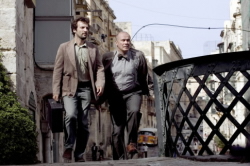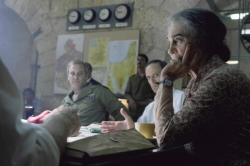Stuart:
Munich is easily the best film Spielberg has made since Schindler’s List, and probably just as powerful. He tackles a controversial subject masterfully – with a highly articulate tale that understands that there are two sides to the Palestinian/Israeli conflict, but also makes it clear that the acts of murder perpetrated by both sides were atrocious and reprehensible crimes. Tony Kushner, writer of the brilliant ‘Angels In America’ (possibly the best thing ever to grace the small screen) and Eric Roth adapted the script from George Jonas’ book, and together with Spielberg have created a wonderfully gripping film that is oh so serious at the same time. The issues and arguments are laid out succinctly and with very little Hollywood-type grandstanding or clumsy moralising.
 Since his move to Hollywood, Eric Bana has done little to impress me, performing in such turkeys as Troy, Black Hawk Down and The Hulk. Here he is brilliant as the leader of the group – at the same time dedicated and conflicted, murderous and benevolent. Daniel Craig (the next James Bond) is fantastic as the ‘most ruthless’ of the killers and the multitalented Mathieu Kassovitz (director of La Haine) great as the more quietly spoken bomb expert. These aren’t a crack team of elite assassins, however. They make mistakes and are clearly in over their head, but this is what makes the story so effective. They are ordinary people doing extraordinary things. Geoffrey Rush performs well as their superior, but is (surprisingly) nothing to write home about.
Since his move to Hollywood, Eric Bana has done little to impress me, performing in such turkeys as Troy, Black Hawk Down and The Hulk. Here he is brilliant as the leader of the group – at the same time dedicated and conflicted, murderous and benevolent. Daniel Craig (the next James Bond) is fantastic as the ‘most ruthless’ of the killers and the multitalented Mathieu Kassovitz (director of La Haine) great as the more quietly spoken bomb expert. These aren’t a crack team of elite assassins, however. They make mistakes and are clearly in over their head, but this is what makes the story so effective. They are ordinary people doing extraordinary things. Geoffrey Rush performs well as their superior, but is (surprisingly) nothing to write home about.
The more sombre moments of Munich are punctuated by several outstanding set pieces that are almost Hitchcockian in their effectiveness. These are as exciting as they are harrowing, and had me on the edge of my seat. Munich doesn’t shy away from violence or (more significantly) its consequences, and is in fact at times quite harrowing. Such moments are important considering narrative’s ties to the real events – this isn’t an issue to beautify or tiptoe around.
John William’s score is surprisingly subtle. After being pummelled about the face by his work in Star Wars: Episode III – Revenge of the Sith, I am now reminded that he is quite an adaptable master composer. The most effective and memorable scenes in Munich play out with no music whatsoever, reinforcing my opinion that such a story should never be glamorised.
The only criticism I have is with the film’s length. Audiences are now most likely familiar with the director’s tendency to go on and on, and while there are a couple of gratuitous scenes in Munich, there is thankfully only one ending (as opposed to Artificial Intelligence: AI). Even at 163 minutes, this is the least bloated film he’s done in recent years.
Hats off to Mr Spielberg and his creation, which is as thrilling as it is powerful and pertinent. This master filmmaker still has the ability to make us sit up and listen, even 35 years after a monster truck tried to mow down an innocent man.
Rating:

Review by Stuart Wilson, 27th January 2006
Hoopla Factor:

Mark:
In 1972, Palestinian terrorists, from a group later to be called ‘Black September’, walked unobstructed and heavily armed into the Munich Olympic Games Athletes Village, and took many of the Israeli team members hostage. Killing two initially, and then the remaining eleven in a botched attempt to fly for freedom, their endeavours were telecast live to a shocked worldwide audience, horrified that more Jewish blood could be spilled in Germany, so few years after the atrocities of World War II. The subsequent response of the Israeli nation forms the basis of this film.
 Eric Bana, Australia’s rising star, plays the ‘hero’ of the piece, Avner, the Israeli agent whose task it is to hunt and kill those responsible for the Munich killings. Leading a multi-national team of Jews, played by Daniel Craig, Ciarán Hinds, Mathieu Kassovitz and Hanns Zischler, they travel Western Europe, planning and then executing their foes. Much of the film follows their travails, and the sheer amount of time we spend in the presence of these men, Avner in particular, means we identify vastly more powerfully with them than with their victims. This is the first of several misfires by director Steven Spielberg.
Eric Bana, Australia’s rising star, plays the ‘hero’ of the piece, Avner, the Israeli agent whose task it is to hunt and kill those responsible for the Munich killings. Leading a multi-national team of Jews, played by Daniel Craig, Ciarán Hinds, Mathieu Kassovitz and Hanns Zischler, they travel Western Europe, planning and then executing their foes. Much of the film follows their travails, and the sheer amount of time we spend in the presence of these men, Avner in particular, means we identify vastly more powerfully with them than with their victims. This is the first of several misfires by director Steven Spielberg.
The bulk of the 164 minute (!) running time is spent watching Avner and his men plan and kill the people on their list, and although much has been made of the supposed questions of conscience these men face, this theme is underdeveloped throughout. Another element of directorial failure, the scarce moments where the characters are shown wrestling their inner demons are so vastly outweighed by the time spent watching their crimes, the point is sadly missed.
There are some wonderful sequences in Munich, that almost make up for its bloated length – the second of the assassinations does display elements of the best thrillers and is the highlight of the action set-pieces. The sequence where Avner is forced to cooperate with a Palestinian terrorist – who, not knowing he is Israeli, talks to him of his hatred of the Jews and their maltreatment of his Arab family – is the major portion of Spielberg’s presentation of the Palestinian perspective, and as such is a welcome relief from prolonged exposure to the Israeli side alone.
The supporting cast, in particular Ciarán Hinds and Daniel Craig, are excellent, and it is a thrill to see familiar faces like Ayelet Zorer (Nina’s Tragedies) and Moritz Bleibtreu (Agnes And His Brothers) scattered throughout – their presence in an American film likely reflects only the setting, but the multinational casting approach is one of Munich’s strengths. Lynn Cohen steals all her scenes as Israeli Prime Minister Golda Meir, demonstrating dramatic ability mixed with a sorrowful smile. Geoffrey Rush also contributes in another excellent supporting turn.
Lynn Cohen steals all her scenes as Israeli Prime Minister Golda Meir, demonstrating dramatic ability mixed with a sorrowful smile. Geoffrey Rush also contributes in another excellent supporting turn.
Sadly, the final scenes do not do justice to Spielberg’s intentions. In particular, an appallingly misguided sex scene montage seems so out of place as to make one wonder if that sequence was edited on his day of rest. Also, the failure to truly develop the psychic torture that Avner must experience throughout the film means the malcontent he expresses in the denouement seems trite and unjustified.
Director Steven Spielberg has called his ‘Inspired by Real Events’ story of the hunt for the perpetrators of the Munich massacre of Israeli athletes a ‘prayer for peace’, but by choosing to focus his story so heavily on one side, he inadvertently imbues only that side with human characteristics. The Palestinian perspective is never properly presented, and the overwhelming effect of such a one-sided retelling is that one is manipulated into choosing. His attempt to edify thus fails.
Rating: 
Review by Mark Lavercombe, 28th January 2006
Hoopla Factor: 
←Valiant
Brokeback Mountain→ Since his move to Hollywood, Eric Bana has done little to impress me, performing in such turkeys as Troy, Black Hawk Down and The Hulk. Here he is brilliant as the leader of the group – at the same time dedicated and conflicted, murderous and benevolent. Daniel Craig (the next James Bond) is fantastic as the ‘most ruthless’ of the killers and the multitalented Mathieu Kassovitz (director of La Haine) great as the more quietly spoken bomb expert. These aren’t a crack team of elite assassins, however. They make mistakes and are clearly in over their head, but this is what makes the story so effective. They are ordinary people doing extraordinary things. Geoffrey Rush performs well as their superior, but is (surprisingly) nothing to write home about.
Since his move to Hollywood, Eric Bana has done little to impress me, performing in such turkeys as Troy, Black Hawk Down and The Hulk. Here he is brilliant as the leader of the group – at the same time dedicated and conflicted, murderous and benevolent. Daniel Craig (the next James Bond) is fantastic as the ‘most ruthless’ of the killers and the multitalented Mathieu Kassovitz (director of La Haine) great as the more quietly spoken bomb expert. These aren’t a crack team of elite assassins, however. They make mistakes and are clearly in over their head, but this is what makes the story so effective. They are ordinary people doing extraordinary things. Geoffrey Rush performs well as their superior, but is (surprisingly) nothing to write home about.
 Eric Bana, Australia’s rising star, plays the ‘hero’ of the piece, Avner, the Israeli agent whose task it is to hunt and kill those responsible for the Munich killings. Leading a multi-national team of Jews, played by Daniel Craig, Ciarán Hinds, Mathieu Kassovitz and Hanns Zischler, they travel Western Europe, planning and then executing their foes. Much of the film follows their travails, and the sheer amount of time we spend in the presence of these men, Avner in particular, means we identify vastly more powerfully with them than with their victims. This is the first of several misfires by director Steven Spielberg.
Eric Bana, Australia’s rising star, plays the ‘hero’ of the piece, Avner, the Israeli agent whose task it is to hunt and kill those responsible for the Munich killings. Leading a multi-national team of Jews, played by Daniel Craig, Ciarán Hinds, Mathieu Kassovitz and Hanns Zischler, they travel Western Europe, planning and then executing their foes. Much of the film follows their travails, and the sheer amount of time we spend in the presence of these men, Avner in particular, means we identify vastly more powerfully with them than with their victims. This is the first of several misfires by director Steven Spielberg. Lynn Cohen steals all her scenes as Israeli Prime Minister Golda Meir, demonstrating dramatic ability mixed with a sorrowful smile. Geoffrey Rush also contributes in another excellent supporting turn.
Lynn Cohen steals all her scenes as Israeli Prime Minister Golda Meir, demonstrating dramatic ability mixed with a sorrowful smile. Geoffrey Rush also contributes in another excellent supporting turn.